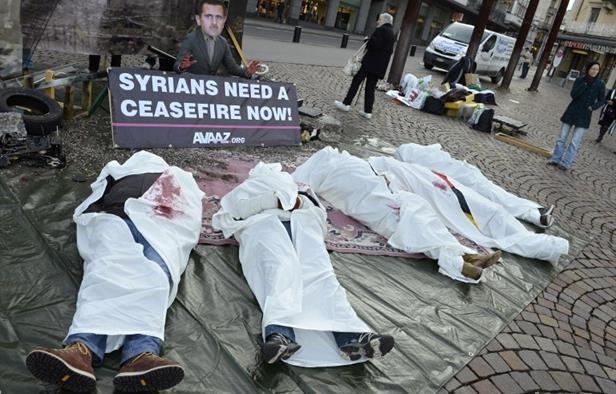Syria ceasefire deal before the New Year: Turkey

Turkey and Russia are planning to implement a countrywide ceasefire in Syria before the start of the New Year, Turkish Foreign Minister Mevlut Cavusoglu said on Thursday.
The ceasefire could be put in place "at any moment", the minister told al-Haber television, after reports a day earlier that Turkey and Russia had agreed a deal.
"We are planning to secure this before the beginning of the New Year," he said, adding it was the "will of the leaders" for this to happen.
However, the details of the proposed deal remain unclear, and rebel groups party to negotiations say major sticking points remain.
Turkish state-run news agency Anadolu said on Wednesday that Turkey and Russia had agreed a nationwide truce plan for Syria, but none of the key players in the conflict offered immediate confirmation.
Cavusoglu said that if the ceasefire was successful, political negotiations between Syrian President Bashar al-Assad's government and the opposition would take place in the Kazakh capital Astana.
As the ceasefire deal is hammered out, opposition groups are reportedly meeting with Russian officials in Turkish capital Ankara to agree the fine details of a truce.
Syrian opposition news site Orient on Thursday published what it claimed were the demands of the opposition groups gathered in Ankara, including new negotiations towards a political solution within a month of the ceasefire coming into effect and humanitarian aid for all besieged areas.
Ahrar al-Sham, one of the biggest groups operating in Syria, said on Thursday that it was too soon to speculate as to the success of the negotiations.
Munir al-Siyal, head of Ahrar al-Sham's political wing, told Reuters that Russia was demanding that the rebel stronghold of Eastern Ghouta - just outside the capital Damascus - be excluded from a ceasefire deal, meaning shelling of the area could continue.
Siyal said it was "absolutely unacceptable" to exclude "liberated" areas of Syria from a ceasefire deal, saying: "It is too early to talk about the chances of success - Russia does not have a clear vision, and is just repeating the sectarian demands of the regime."
'Complementary' talks no rival to UN
If the warring sides do manage to agree a ceasefire, the parties will meet in Astana to discuss a more wide-ranging peace deal.
Cavusoglu has insisted that any eventual talks in Astana, to be overseen by Turkey and Russia, would not be a rival to UN-backed talks that have been taking place on and off in Geneva for years.
"This is not an alternative to Geneva. It is a complementary step," said Cavusoglu.
"The talks in Astana will be under our supervision," he said, adding that discussion continues over which groups will take part.
He said Ankara and Moscow continued intensive efforts to secure the ceasefire.
Russia would act as the Syrian government's "guarantor" in any deal, while Turkey would also perform a similar role for the other side.
Although Moscow and Ankara are on opposite sides in the civil war with Russia supporting Assad and Turkey calling for him to go, they have begun in the last few months to work closely on Syria.
Relations between Ankara and Moscow were normalised in June, after they were cut off last November when Turkey shot down a Russian warplane on the Syrian border.
Tens of thousands of people were evacuated from Aleppo after a ceasefire earlier this month brokered by Ankara and Moscow.
However, Cavusoglu said it would be "out of the question" for Turkey to hold any direct talks with Assad.
Middle East Eye propose une couverture et une analyse indépendantes et incomparables du Moyen-Orient, de l’Afrique du Nord et d’autres régions du monde. Pour en savoir plus sur la reprise de ce contenu et les frais qui s’appliquent, veuillez remplir ce formulaire [en anglais]. Pour en savoir plus sur MEE, cliquez ici [en anglais].

